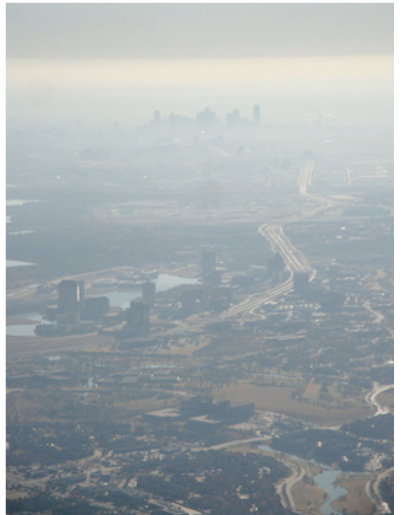Drilling is to Dallas what Keystone is to Canada
 Word comes today that the recent updating of a national Canadian Greenhouse Gas emissions inventory shows all industrial and commercial sectors holding steady or making progress in 2010, save one: Oil and Gas. Canada had to perform the inventory under the terms of the United Nations Framework Convention on Climate Change. Unfortunately, the dramatic rise in emissions from oilsands (Re: Keystone) and gas development more than off-set the progress in the rest of the economy. This is the money quote from the Canada.Com article: “Canada’s official report last year generated controversy because of a decision to exclude a breakdown of oilsands emissions from the inventory, even though this emissions breakdown was included in the previous year’s inventory. The missing details eventually revealed that the booming sector’s pollution was dramatically rising to levels that would make it difficult for the federal government to meet its own annual emissions target of 607 megatonnes of carbon dioxide equivalent emissions by 2020.” Now, come south to Dallas. We know City Hall is sitting on a similar updating of Greenhouse Gas pollution emissions being emitted by both City of Dallas operations, and the metropolis as a whole. This pollution inventory was required by the 2005 Mayor’s Climate Change Agreement, of which Dallas is a signatory. Cities pledged to cut 2012 GHG pollution to 1990 levels. We’ll see how close or far Dallas is to accomplishing that goal when the numbers are released. But here’s the real number you need to keep an eye on – the amount of Greenhouse Gas pollution emitted by industrial sources in Dallas. The last time the city did such a survey, it totaled only 25,000 tons a year from all large industrial facilities combined. By contrast, a single gas compressor can easily spew 25,000 tons a year of the same kind of pollution. Gas fields have multiple compressors. It’s not unusual for large compressors to emit up to 50,000, 75,000, even 90,000 tons or more of air pollution every single year. Without mitigating or off-setting this tidal wave of air pollution from gas drilling, Dallas will never be able to meet its obligations to reduce its Greenhouse Gas pollution, and in fact, it will be responsible for making local air quality much worse. A vote to allow unfettered drilling is a vote for immediately doubling the industrial GHG pollution coming from Dallas, and in the long run, a vote to increase it by probably a magnitude or two. Why should you care if climate change doesn’t get you excited? The same GHG pollution making it impossible for Dallas to reduce its carbon footprint is the same air pollution that makes our smog worse, and its the same air pollution that makes it 66% more likely for you to contract cancer if you live within a half-mile of a gas well. It’s all inter-connected. Dallas is poised to reverse years of air quality progress if it doesn’t do something to address the large increases in air pollution caused by gas drilling.
Word comes today that the recent updating of a national Canadian Greenhouse Gas emissions inventory shows all industrial and commercial sectors holding steady or making progress in 2010, save one: Oil and Gas. Canada had to perform the inventory under the terms of the United Nations Framework Convention on Climate Change. Unfortunately, the dramatic rise in emissions from oilsands (Re: Keystone) and gas development more than off-set the progress in the rest of the economy. This is the money quote from the Canada.Com article: “Canada’s official report last year generated controversy because of a decision to exclude a breakdown of oilsands emissions from the inventory, even though this emissions breakdown was included in the previous year’s inventory. The missing details eventually revealed that the booming sector’s pollution was dramatically rising to levels that would make it difficult for the federal government to meet its own annual emissions target of 607 megatonnes of carbon dioxide equivalent emissions by 2020.” Now, come south to Dallas. We know City Hall is sitting on a similar updating of Greenhouse Gas pollution emissions being emitted by both City of Dallas operations, and the metropolis as a whole. This pollution inventory was required by the 2005 Mayor’s Climate Change Agreement, of which Dallas is a signatory. Cities pledged to cut 2012 GHG pollution to 1990 levels. We’ll see how close or far Dallas is to accomplishing that goal when the numbers are released. But here’s the real number you need to keep an eye on – the amount of Greenhouse Gas pollution emitted by industrial sources in Dallas. The last time the city did such a survey, it totaled only 25,000 tons a year from all large industrial facilities combined. By contrast, a single gas compressor can easily spew 25,000 tons a year of the same kind of pollution. Gas fields have multiple compressors. It’s not unusual for large compressors to emit up to 50,000, 75,000, even 90,000 tons or more of air pollution every single year. Without mitigating or off-setting this tidal wave of air pollution from gas drilling, Dallas will never be able to meet its obligations to reduce its Greenhouse Gas pollution, and in fact, it will be responsible for making local air quality much worse. A vote to allow unfettered drilling is a vote for immediately doubling the industrial GHG pollution coming from Dallas, and in the long run, a vote to increase it by probably a magnitude or two. Why should you care if climate change doesn’t get you excited? The same GHG pollution making it impossible for Dallas to reduce its carbon footprint is the same air pollution that makes our smog worse, and its the same air pollution that makes it 66% more likely for you to contract cancer if you live within a half-mile of a gas well. It’s all inter-connected. Dallas is poised to reverse years of air quality progress if it doesn’t do something to address the large increases in air pollution caused by gas drilling.
